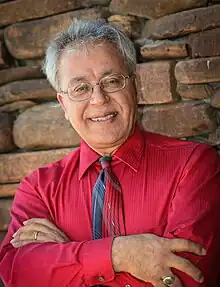Edip Yüksel | |
|---|---|
 | |
| Born | December 20, 1957 |
| Occupation(s) | Author, Activist, Professor Inventor |
| Movement | Quranism |
| Relatives |
|
| Website | 19 |
Edip Yüksel (born December 20, 1957, in Güroymak, Turkey) is an American-Kurdish activist and prominent figure in the Quranism movement.[1] He is a colleague and friend of the late Rashad Khalifa.[1]
Biography
Yüksel comes from a Kurdish family who lived in Turkey, and is brother of Metin Yüksel.[2] He is the author of more than twenty books on religion, politics, philosophy and law in Turkish. He has also written various articles and essays in English. He was a Turkish Islamist and a popular Islamic commentator until the mid-1980s when he rejected his previous religious beliefs and only used the Quran as the source of divine laws. He became a Quran-only Muslim, or known as Quranist. However, this movement is very controversial in the main Muslim circles, and thus Yüksel gained the rejection and hostility of many religious Islamic authorities in his home country. In 1989 Yüksel was forced to emigrate. He then settled in the United States of America, where he began his career as a lawyer.[3] In the US, he worked with Rashad Khalifa, who claimed to have discovered a Quran code, also known as Code 19, in the Quran and called on Muslims to return to the Quran alone and to abandon all hadiths.[4]
Yüksel is critical of Islamic creationists, such as the jailed cult leader Harun Yahya.[5]
Professor Aisha Musa, from Florida International University, says in her book Hadith as Scripture about Yüksel:
Although Yüksel initially came to his belief that the Qur'an is the only legitimate source of religious guidance in Islam, his own writings show much more independence than does the work of Kassim Ahmad. Like Khalifa and Ahmad, Yüksel rejects the Hadith using the same Qur'anic criteria. However, he differs with Khalifa in his interpretation of the Qur'an on a number of issues, [...]. Yüksel's work represent a new trend that has emerged in the modern-day Qur'anist movement in the last several years[.][1]
References
- 1 2 3 Musa, Aisha Y. (2008). Hadith as Scripture: Discussions on the Authority of Prophetic Traditions in Islam (1st ed.). New York, N.Y.: Palgrave Macmillan. p. 100. ISBN 978-0-230-60535-0.
- ↑ Yuksel, Edip (1998). "Yes, I am a Kurd". Journal of International Law and Practice. 7: 359 – via Academia.
- ↑ Yüksel, Edip (2015). Norşin'den Arizona'ya: sıradan bir adamın sıradışı öyküsü (in Turkish). Ozan Yayıncılık. ISBN 978-605-4723-76-8.
- ↑ Brown, Daniel W. (2017-08-10). "Chapter 19: Qurʾānists". In Berg, Herbert (ed.). Routledge Handbook on Early Islam. Routledge. ISBN 978-1-317-58920-4.
- ↑ Higgins, Andrew (17 March 2009). "An Islamic Creationist Stirs a New Kind of Darwinian Struggle". The Wall Street Journal.